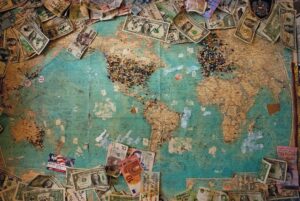What is Forex Trading and How Does It Work?
Forex trading, also known as foreign exchange trading, is the decentralized global market where currencies are bought and sold. It is the largest and most liquid market in the world, with an average daily trading volume of over $6 trillion. In this article, we will explore the basics of forex trading, including how it works and why it has become such a popular investment option.
At its core, forex trading involves speculating on the value of one currency against another. For example, if you believe that the value of the euro will increase relative to the US dollar, you would buy euros and sell dollars. If your prediction turns out to be correct, you can sell the euros back for a profit. However, if the value of the euro decreases, you would incur a loss.
One of the key features of forex trading is the use of leverage. Leverage allows traders to control larger positions in the market with a relatively small amount of capital. For example, a leverage ratio of 100:1 means that for every $1 in your trading account, you can control $100 in the forex market. While leverage can amplify profits, it can also magnify losses, so it is important to use it judiciously and understand the risks involved.
Forex trading takes place over-the-counter (OTC), meaning that there is no centralized exchange where all transactions are conducted. Instead, trading is done electronically through a network of banks, financial institutions, and individual traders. This decentralized nature of the market means that forex trading can take place 24 hours a day, five days a week, across different time zones.
The forex market is made up of various participants, each with their own motivations for trading. Commercial banks, central banks, and corporations engage in forex trading to facilitate international trade and manage their foreign exchange exposure. Investment funds and hedge funds trade currencies to diversify their portfolios and generate profits. Individual retail traders, like you and me, participate in forex trading to take advantage of price fluctuations and make profits.
To begin trading forex, you will need a forex broker. A forex broker is an intermediary who provides access to the forex market and executes trades on your behalf. When choosing a broker, it is important to consider factors such as regulation, trading platform, customer support, and trading costs.
Once you have chosen a broker, you can open a forex trading account and deposit funds. Most brokers offer different types of accounts, catering to the needs of different traders. Some accounts require a minimum deposit, while others offer the flexibility to start with smaller amounts. It is advisable to start with a demo account before trading with real money to familiarize yourself with the trading platform and practice your strategies.
The forex market is driven by various factors that influence the supply and demand of currencies. Economic indicators, such as GDP growth, inflation rates, and interest rates, can have a significant impact on currency values. Political events, such as elections and geopolitical tensions, can also affect the forex market. Traders use fundamental and technical analysis to analyze these factors and make informed trading decisions.
Fundamental analysis involves studying economic and political indicators to determine the intrinsic value of a currency. By understanding the underlying factors that drive currency movements, traders can make predictions about future price movements. Technical analysis, on the other hand, involves analyzing historical price data and using charts and indicators to identify patterns and trends.
Forex trading offers a wide range of trading opportunities, with major currency pairs, such as EUR/USD and GBP/USD, being the most commonly traded. However, there are also exotic currency pairs, which involve currencies from emerging economies. These pairs can be more volatile and carry higher risks. Traders can also choose to trade forex through derivatives such as futures and options, which offer additional flexibility and risk management tools.
In conclusion, forex trading is a dynamic and accessible investment option that allows traders to speculate on the value of currencies. With its decentralized nature, high liquidity, and leverage, forex trading offers opportunities for both short-term and long-term traders. However, it is important to approach forex trading with caution and educate yourself about the risks involved. By understanding the basics of forex trading and using proper risk management techniques, you can potentially profit from the fluctuations in the global currency market.






